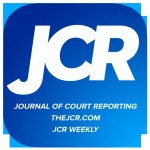 By Cecilee Wilson
By Cecilee Wilson
Through the course of my 39-year career as a professional reporter, as well as my 20 years providing broadcast captioning and CART services for many organizations and television stations, I have developed a strong conviction of the importance of our role in the Deaf and hard-of-hearing community and our responsibility to provide ethical, professional services to our clients.
In March of 2015, the Federal Communications Commission (FCC), with extensive input from the NCRA, made significant rule changes regarding broadcast captioners. While these rule changes did not directly affect CART providers, the NCRA Board of Directors in November of 2015 approved and adopted a Code of Ethics and Professional Conduct based partly on these rule changes. This code was adopted for both CART and broadcast captioners to set a standard of quality and professionalism in our field.
While there are not currently any interstate or federal requirements for CART providers, some states have adopted standards in order to maintain the quality of services offered beyond basic certification.
As our field has developed and changed, many CART providers and captioners no longer understand the relevance of NCRA in their professional lives.
Many times we hear, “Where was NCRA when…” in conversation or on social media, in cases where the role of the Association would not have been applicable.
What can NCRA do? Influence legislation, build up and promote the profession, and search out new applications for the court reporting profession are a few things that NCRA does on an ongoing basis. In fact, the CART and captioning segments of the profession would not be even close to where they are today without the influence that NCRA has had on federal law and in Deaf and hard-of-hearing groups. That’s why it is more important than ever that we continue to support the policies established by NCRA to maintain a high standard of work across our profession.
In my work, the biggest problem I see first-hand is the provider who misrepresents their level of expertise, leaving the consumer with less-than-adequate accommodations. Judicial court reporters and deposition reporters are generally heavily regulated by individual states. In the “olden days” if a student felt they could not pass the rigorous testing of their state CSR laws or NCRA testing, some would choose to go into CART as a “fall-back” so as to be less regulated and get through school early. Unfortunately, taking the easier path has resulted in a wide variety of skill levels in our profession. Our clients, without the necessary tools and information to adequately judge the providers and services, are the ones who end up suffering for it.
Though the word “accurate” is present in both the FCC rules and the guidelines established by NCRA, there is no set standard for accuracy or untranslate percentages, either for CART or broadcast captioning. In many instances the absence of a legally enforced standard is an asset due to the increased costs and time that would be needed to enforce the standards. But that does not mean that we are unable to hold ourselves and our community to higher expectations.
Deaf groups that I have worked with have expressed a desire for standards for CART providers, even at different skill levels, in an effort to have an established level that would be commensurate with remuneration; to show the clients in the community that “you get what you pay for” when it comes to the services and skills you will receive and the fees associated with hiring a highly skilled professional. In my state it is not uncommon for clients to call a non-]certified CART provider because they would like to save their resources (money) and hire me when it is “really important.” Many consumers are also unaware of the NCRA services locater that lists its certified CART captioners.
The pitfall comes when a provider promotes themselves as highly skilled and charges accordingly, but provides services that are substandard and ineffective. This not only frustrates clients and other providers who may have been better able to offer the necessary services, but it also creates an atmosphere of distrust between clients and providers because of prior bad experiences.
I recall one conference in particular, where I was providing CART for a young person from another state, who was accompanied by his mother. She had been skeptical about hiring a CART provider because she had typically been unable to get high-quality CART services in her home state. She was very impressed that someone would provide that level of service, since she was unable to get that in her locale, regardless of the cost. She and her son would have benefitted from an established standard across our profession so that she was confident in the services she could expect to receive.
In my opinion the most effective way to increase the quality of the CART and captioning profession is to encourage others in our profession to become members of NCRA, and for all of us to sincerely adopt the ethics and professional guidelines in our everyday practice.
The Code of Professional Ethics includes provisions that we determine fees independently, avoid or disclose conflicts of interest or even the appearance of impropriety, preserve confidentiality, and be truthful when representing our qualifications. We are also encouraged to support the relationships in our community by providing pro bono services when the situation calls for them.
We must also diligently keep ourselves educated on current literature and technological advances and developments in order to offer the highest quality services possible. This should also include awareness of changing regulations and standards. As members of NCRA we are also required to maintain the integrity of our profession, abide by the NCRA Constitution & Bylaws, and participate in national, state, and local association activities. These should be the way each of us, as professionals, run our lives.
This aspect of activism in our Association is vital to our effectiveness. If we do not establish and enforce professional standards ourselves, as well as advocate for our concerns, then these standards are open to being set and enforced by outside interests without the necessary representation from our community.
As NCRA members and broadcast and CART captioners, we need to encourage others in our professional community to become members of NCRA and help to enforce the professional standards we have set, and continue to offer a high-quality service to our clients. This will help alleviate the problems of overstated services being offered, undercutting prices of professionals in our field, and educating consumers so they will not be taken advantage of. We need to educate ourselves on the Code of Ethics and Professional Guidelines, hold ourselves to the standards we have established, and support the work of NCRA through membership and activism. We have to change from being active to being activists.
Cecilee Wilson, RDR, CRR, CBC, CCP, of Kaysville, Utah, is a member of NCRA’s Committee on Professional Ethics.








